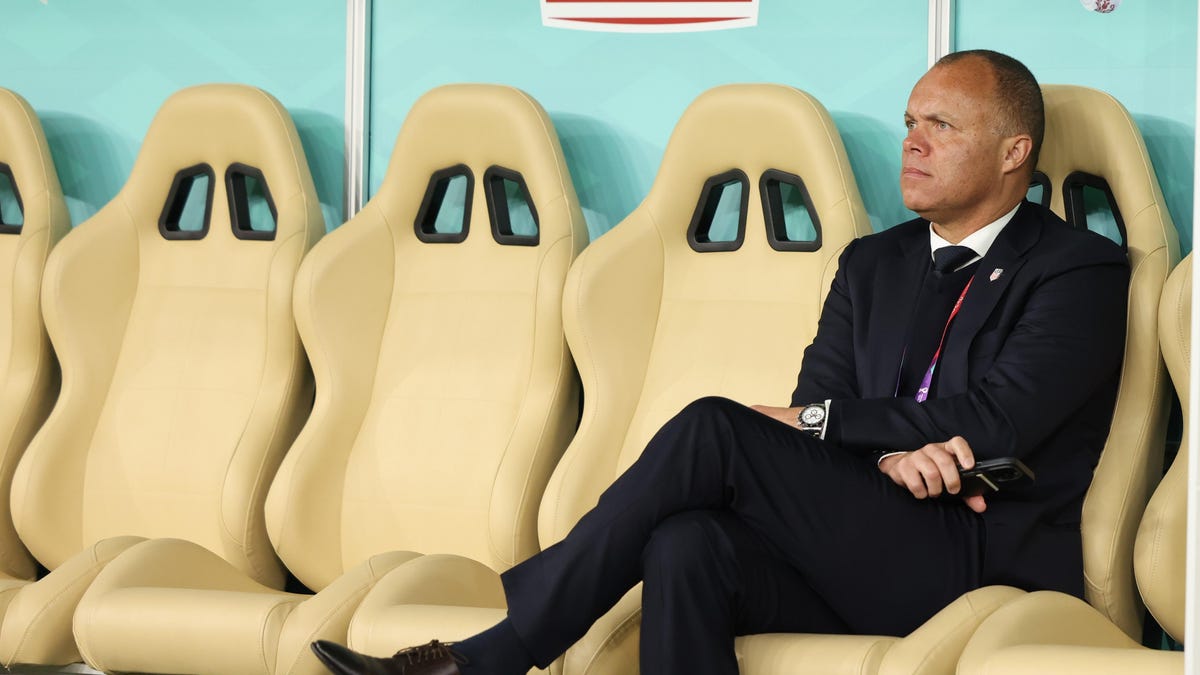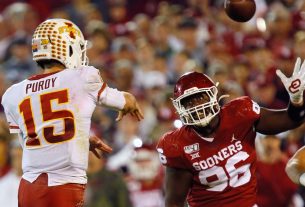There’s burning the ships, and then there’s this.
After a mostly feel-good tournament at the World Cup — not great, but not disappointing either — U.S. Soccer certainly has found a way to make everyone completely forget what happened in Qatar. Some of that isn’t their fault. The Berhalter-Reyna modern-day Shakespearean family feud — they used texts instead of sabers — kind of happened to U.S. Soccer. The dragging their feet on either re-hiring Berhalter or moving on is at their feet. Then there was the “Hey look over there!” ploy of leaking that they had at least tried to send an envoy to Zinedine Zidane. And now having to replace the entire hierarchy on the men’s side is yet another opportunity for them to reshape how the USMNT works. Or to completely bork it, as has generally been their M.O.
Earnie Stewart is leaving his position as sporting director of U.S. Soccer for a similar position with PSV. Stewart had ascended to that spot from the GM chair, which he was hired into after the balls-up that was the 2018 qualifying campaign. This follows Brian McBride, who had been in the GM chair after Stewart shuffled one down the hall, leaving his post as well. Which means U.S. Soccer has to fill in everything between the board and the playing roster. And they also have to decide how exactly they want that to look, whether it’s how it was with McBride and Stewart or a new structure.
All of this punts the hiring of a new manager down the road, because U.S. Soccer doesn’t have anyone to make that decision, or even have decided what role will be making that decision. Are they going to stick with having a GM on both sides? Will the board just hire the manager directly and carry on that way? You can be sure that with the speed with which all of this happened, combined with the Reyna mishegas, U.S. Soccer doesn’t have any answers to any of those questions. It’s not really their thing.
What makes all of this even stranger, not just because it’s U.S. Soccer with its inherent silliness and strangeness, is that it was sort of unclear what Stewart and McBride actually did.
Stewart’s original position of GM was created when U.S. Soccer had to at least look to be overhauling everything after the disaster of Couva. And it did at least feel right that a bunch of suits in a boardroom weren’t the ones picking the next manager — a position the organization had to get right — when that was seen as one of the big reasons the program had become such a mess. So insert Stewart, a former player that no one had any huge objections to, who at least felt like he was a “soccer guy” instead of a glorified marketing exec.
Except, U.S. Soccer landed on Berhalter while only ever interviewing one other candidate, half-heartedly. And Berhalter, as everyone knows, is the brother of Jay Berhalter, who at the time was U.S. Soccer’s chief commercial operator. An exhaustive search through a variety of candidates with an open mind to new approaches this was not. U.S. Soccer stayed in their very tiny, some would say incestuous, lane. Did they need to create a new position and make a big deal about a new method of doing things just to hire the guy it was obvious they were going to hire all along?
Once the manager was in place, a GM could theoretically take a hand in scouting and picking a roster, but it’s not like a national team manager is overburdened with activity. It’s why some wondered what it was McBride did other than lend the general esteem his name has with fans and media to the organization. It felt like U.S. Soccer created even more bureaucracy in the wake of their lowest moment to have the appearance of doing something.
Is it beneficial to have someone between the board and the manager positions for both the USMNT and the USWNT? Almost certainly, especially as the U.S. Soccer board has had to spend a lot of time not protecting their players, listening to their repeated calls of abuse, or being on the wrong end of lawsuits, or now cleaning all that up.
They probably don’t have as much time as necessary for on-field matters, as a sporting director would. But a GM? That always sounded like a bone thrown to U.S. media and fans to try and make U.S. Soccer feel like other sports teams in the country, and a model fans were accustomed to. Not having one is hardly a big deal for U.S. Soccer.
While at first, the idea that the USMNT won’t have a manager until the summer or later feels like yet another instance of U.S. Soccer stepping on a rake covered with scorpions, it really isn’t. It’s been repeated, but the USMNT doesn’t really have anything to do for a while.
There are two Nations League games in March against Grenada and El Salvador, and you’d have a hard time locating anyone who could locate a fuck — flying or ground-based — to give about either of those. There’s a Gold Cup this summer, which as we’ve said before should be turned over to the Olympic U-23 team to give them a dress rehearsal for their excursions at Paris 2024. Let U-23 coach Jason Kreis handle that, in a tournament where he will get players released from their clubs because it’s the region’s official tournament. Olympic teams rarely get this kind of run-up, so take advantage. There’s no other reason to care about a Gold Cup anymore anyway.
There’s no World Cup qualifying, and it’s still not confirmed whether the USMNT will be participating in Copa America 2024. A new manager would need a few games, and gathering before that tournament, should the U.S. be in it, but hiring someone in the summer or even fall should assure that kind of time. Waiting for the summer allows U.S. Soccer to see who leaves their current club jobs and to get a better idea of the landscape in the coming years, i.e. should Pep Guardiola start Erling Haaland at fullback in the Champions League quarterfinals and get Manchester City dumped out again and he just gives up and leaves (a boy can dream).
There is a lot of mess to clean up, and there is a feeling of “here go these dumbasses again.” Every time U.S. Soccer looks inward they tend to make it worse. But at least this time, they have the benefit of time, if they can see it.




